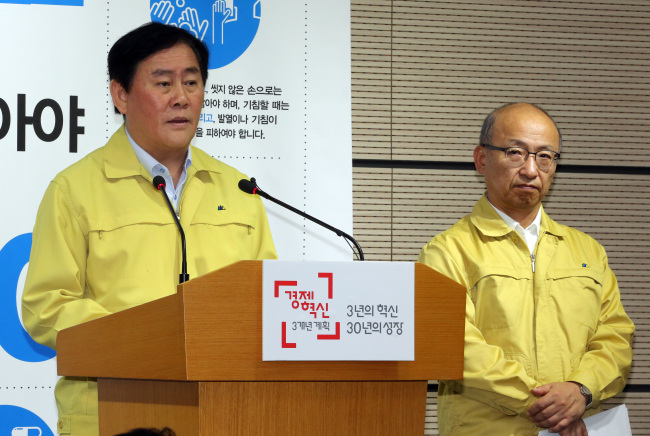The Finance Ministry has decided to offer financial and tax support to small and mid-sized enterprises hit by the outbreak of Middle East respiratory syndrome.
“The industries will include tourism, lodging, artistic performances and hospitals,” Finance Minister Choi Kyung-hwan said during an economy-related ministers’ meeting on Wednesday.
Choi said the ministry would provide SMEs and regions damaged by MERS with financial support worth a total of more than 400 billion won ($360 million).
Its support package will involve issuing loans totaling 100 billion won on low interest rates. The government also plans to roll over the maturity of income tax returns of some businesses.
 |
Finance Minister Choi Kyung-hwan (left) makes a public announcement on MERS in Sejong City on Wednesday as Health Minister Moon Hyung-pyo looks on. (Yonhap) |
In particular, small provincial hospitals and health care centers will be offered funds to normalize their management, according to the ministry.
“To settle down MERS woes, the central government is closely coordinating with the municipal governments nationwide,” Choi said.
He stressed that the government would actively communicate with foreign countries and the World Health Organization to dispel unnecessary worries though scientific research.
“In comprehensive consideration of the sentiment’s effect on the overall economy, (the government), if necessary, will take additional measures to reinvigorate the market,” he said.
In South Korea, the MERS outbreak, which was discovered on May 20, has claimed nine lives and infected more than 100 people so far. This has damaged private consumption over the past few weeks, which policymakers had desperately been trying to boost.
The ministry appears to be pinning hopes on an interest rate cut by the Bank of Korea. The BOK is set to make a decision on the key rate Thursday.
If the central bank’s monetary policy committee chooses to cut the key rate again, following its move in March, it could again stimulate the sagging consumption and corporate investment.
But an increasing number of economists and analysts say a rate cut might not do much to remedy the problem. They cite record outstanding household loans totaling 1.1 quadrillion won and weak purchasing power of the middle- and low-income earners.
On a recent TV program, former BOK Gov. Park Seung also expressed his skepticism over further monetary easing in the current circumstances.
Some stockbrokers predict that the effect on the market will be similar for both options ― easing the rate to 1.5 percent and freezing at 1.75 percent per annum.
By Kim Yon-se (
kys@heraldcorp.com)








![[Weekender] Korea's traditional sauce culture gains global recognition](http://res.heraldm.com/phpwas/restmb_idxmake.php?idx=644&simg=/content/image/2024/11/21/20241121050153_0.jpg)